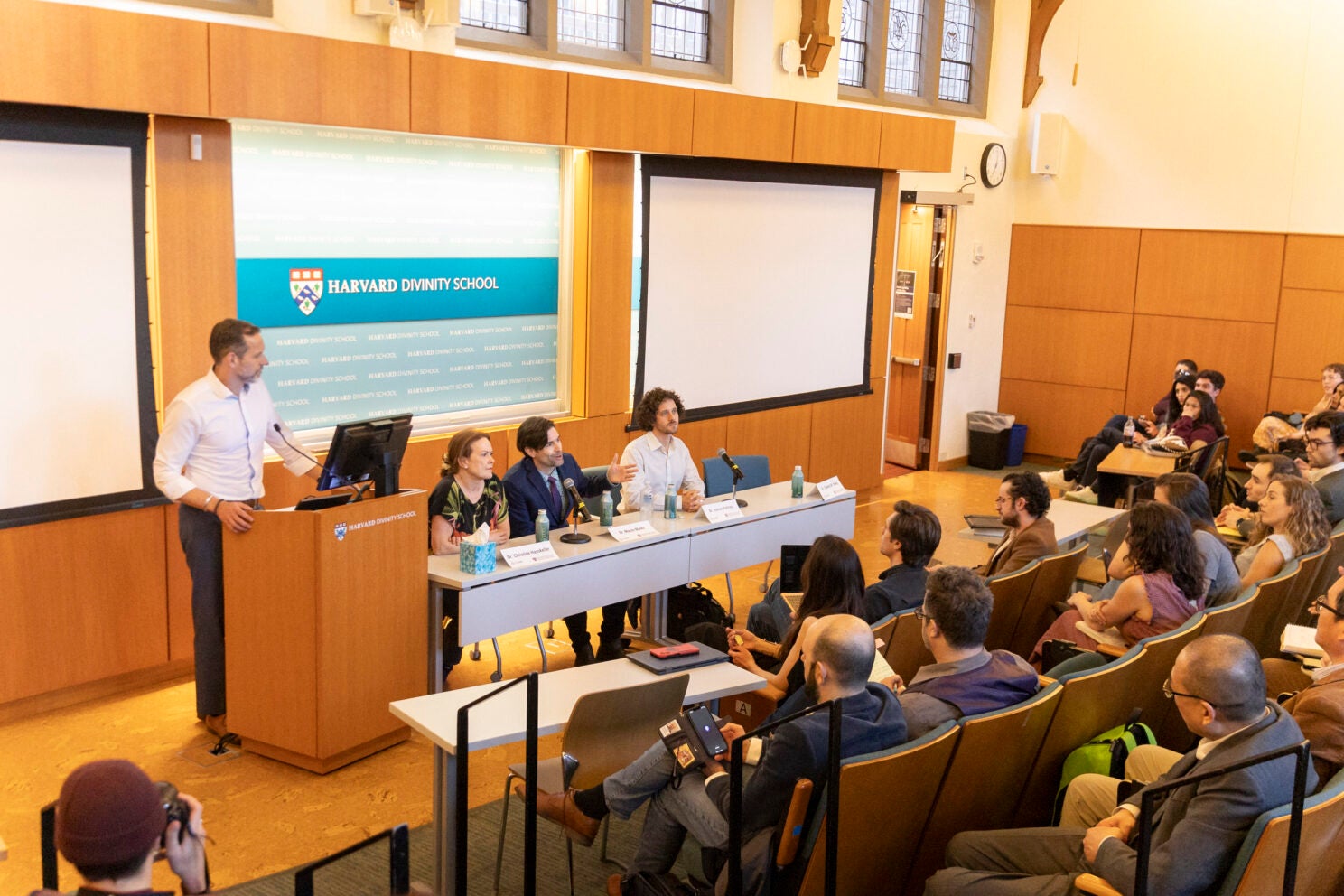Health
How young is too young? No such thing, apparently.
Specialist outlines impact of screen time on developing brains, from toddlerhood to teen years
U.S. children aged 8 and younger spend 2½ hours a day on screens, with kids under 2 exceeding an hour each day, according to a recent report from Common Sense Media.
It’s data that Michael Rich, an associate professor of pediatrics at Harvard Medical School, finds deeply troubling.
Rich is the co-founder and director of the Clinic for Interactive Media and Internet Disorders at Harvard-affiliated Boston Children’s Hospital, where he works with young people whose online activities are interfering with their well-being. He sees digital media as an environmental health issue like clean air.
“We should definitely be asking the owners of these platforms to clean up their products, but we also have to help kids breathe right now,” he said. “We have to help them learn how to thrive in the environment we’ve got.”
Here’s how Rich describes the effect of screens at different stages of development:
Ages 0 ‒ 4
Screens don’t just attract our attention — they shape the structure of our brains.
“We are constantly making synaptic connections between our neurons,” Rich says. “When we use those connections, they get reinforced, but other connections are made and then get pruned away because we don’t use them so much.”
23%
of children age 0 to 8 sometimes or often use a mobile device while eating at home.
— Common Sense Media
The Common Sense report found that by age 4, more than half of children have their own tablet, and that 36 percent of 2- to 4-year-olds watch online videos every day. Rich has sympathy for their parents, many of whom are juggling multiple tasks. But, he said, the most important thing is to aim for the “richest way possible to build a brain.”
While synaptic connections are formed and pruned all through our lives, the brains of infants develop new connections faster. According to Harvard’s Center on the Developing Child, more than a million new neural connections are formed every second in the first few years of life — and these neural pathways lay the foundation for future development.
When babies and toddlers spend time on screens, their brains develop based on input that is at once highly engaging and absent of richer, more meaningful stimulus, Rich said, like the smell of their caregivers’ bodies or the touch of their skin.
“The real issue with screen time is often not what’s coming from the screen being toxic, but what they’re missing out on because they’re on a screen.”
Ages 5 ‒ 12
Over time, screens can “desensitize” children to the simpler sensations of the real world. “When they sit down at the dinner table and their parents are saying ‘How was your day?’ it just isn’t enough,” Rich said.
Rich also worries that much of what children consume on screens requires little to no engagement, a curated list of endlessly entertaining content activated by touch.
“It doesn’t demand that they contribute anything,” he said. “So the other piece is ‘I’m going to be fed stimulus’ as opposed to ‘I have to go out and find my stimulus.’ It doesn’t dull creativity; it just doesn’t give creativity space to happen.”
By age 8, nearly 1 in 4 children have their own phones, according to Common Sense Media, a statistic that Rich said poses new and different challenges.
“The lunchroom, the playground, the hallway between classes — these are the places where kids are individuals in a society of their own making, where they figure out who they like and don’t like, how to pick themselves up after challenges,” he said. “If that kid has in their pocket a phone in which mom can say, ‘How did you do on the math test? Do I need to talk to your teacher? What’s going on in the playground?’ they never get the opportunity to figure these things out for themselves.”
Even so, as state and local leaders move to ban or restrict phones in schools, Rich argues for a more nuanced approach.
“I think that we actually should be teaching kids to use these tools, just like we teach them to use the computer or pencil and paper,” he said. “If we ban phones from schools, we will not have any time or space in which kids are taught how to use these powerful tools effectively. An important part of using them effectively is knowing when they are not the best tool for the job and turning them off.”
Ages 13 and above
By the time kids reach high school, some have the social and emotional skills to regulate their own use of technology. For those who don’t, like the patients at Rich’s clinic, problematic internet use is almost universally a symptom of an underlying mental health condition or neurodivergence, typically depression, social anxiety, autism, or ADHD, he said. Helping teens moderate their internet use is really more about giving them tools to cope with those underlying challenges.
54%
of teens ages 13-17 say they visit YouTube “almost constantly” or “several times a day”
— Pew Research Center
Rich cautioned against thinking about problematic internet use as an addiction, though. “The therapeutic goal with addiction is abstinence,” he said. “The internet is a necessary resource. We need it to learn, to teach, to communicate, to connect.” Misuse “is driven by psychological, not physiological, drivers,” he said.
“We see the better analogy as binge-eating disorder, which is the most prevalent eating disorder. That’s the use of a necessary resource — food — but for psychological reasons, trying to fill that empty hole within. Our goal with binge-eating disorder and with problematic interactive media use is self-regulation, being able to use this tool in ways that are effective and productive.”
Rich is optimistic about a path forward for kids. His prescription: getting comfortable with boredom. That goes for adults, too.
“We’re so averse to boredom that we can’t get on an elevator without pulling our phones out,” he said.
He recommends that at any age, parents model healthy media habits, encourage non-screen activities, and have ongoing conversations about how to critique what kids see on their screens.
“Ultimately, whether we’re talking about television or smartphones or Gen AI, our goal is to help kids be critical thinkers, to be digitally literate in what they receive and also what they create and put out there.”















